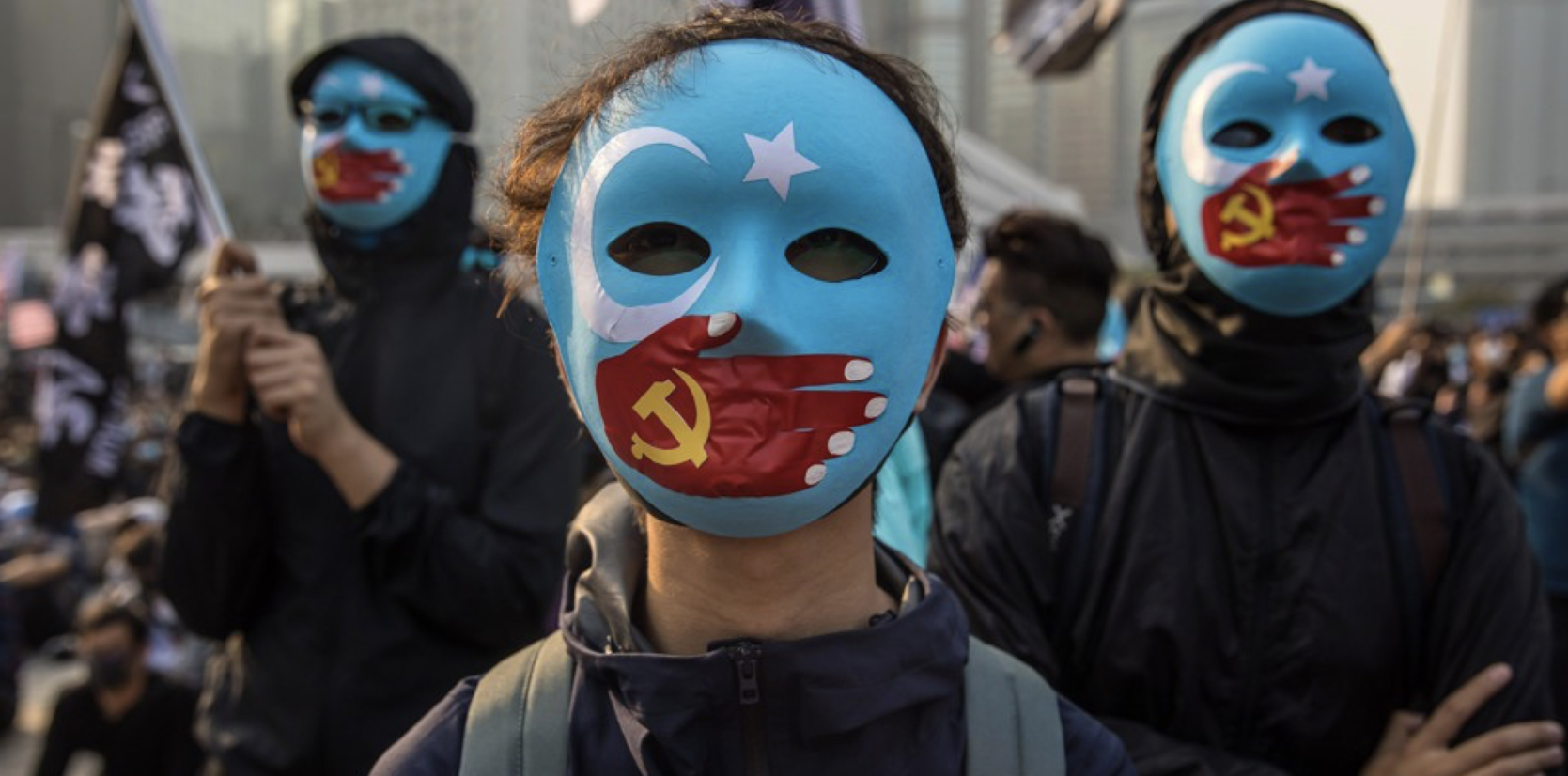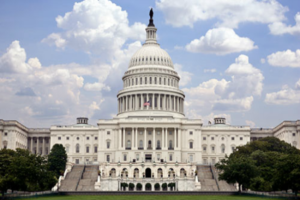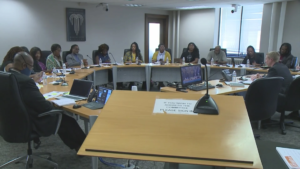Many Americans who brand Trump and his allies as fascists are paying too little attention to abuses in Hong Kong and cultural genocide in Xinjiang.
How do Americans decide what to be outraged about? It seems like ancient history now, but that was one of the questions The New York Times inadvertently raised in June when it appended an editor’s note to an op-ed by Senator Tom Cotton—a piece that some on the Times staff saw as presenting a physical danger not only to the country but to themselves.
The op-ed called for American troops to be sent to “restore order” to cities experiencing violent protests. Outside and inside the Times, it was widely condemned as “fascist” or fascist-adjacent. More recently, though, the Times published an op-ed of a similar vein, except this time readers had the opportunity to glimpse what actual fascism looks like. Fascism, in today’s context, isn’t mere authoritarianism, but the attempt to suppress all dissent, public or private, in the name of the nation; it is the expression of a regimented society that elevates order as both the means and end of all political life.
The October 1 op-ed, by Regina Ip, a member of Hong Kong’s Executive Council, captured such sentiments well. Ip laid out the case for a new Chinese-backed security law that would effectively criminalize anything that might be perceived as “subversion.” Included was one of the most disturbing passages I have read in an American publication:
This time, though, no staff revolt occurred, even though Ip’s article was an elaborate, if refreshingly frank, endorsement of real fascism.
[Read: Hong Kong is a colony once more]
Outrage is always selective. I could have written about something else, but I decided to write about this. The question remains: Why did readers who were infuriated by Cotton’s argument seem to shrug off Ip’s?
Words matter because they help order our understanding of politics both at home and abroad. If Cotton is a fascist, then we don’t know what fascism is. And if we don’t know what fascism is, then we will struggle to identify it when it threatens millions of lives—which is precisely what is happening today in areas under Beijing’s control. Chinese authorities have tightened their grip on Hong Kong. And while the world watches, they are undertaking one of the most terrifying campaigns of ethnic cleansing and cultural genocide since World War II in Xinjiang province, with more than 1 million Muslim Uighurs in internment camps, as well as reports of forced sterilization and mass rape.
For morality to operate, moral proportion is required. Unfortunately, the Trump era has badly damaged our ability to see what’s right in front of our noses.
[Read: Saving Uighur culture from genocide]
Today, the United States is consumed by internal divisions, which means that the flow of ideas is the reverse of what it otherwise might be. Instead of solving problems through the very democratic institutions that once gave inspiration abroad, we now import foreign notions from Europe’s dark past in an attempt to comprehend what seems incomprehensible here in our own country. Donald Trump’s election led to a whole cottage industry of thinking that fascism is near, right here at home. It has grown steadily, reaching its culmination in the lead-up to the November election. In the past month alone, readers have seen Mussolini comparisons from eminent historians, explainers on what it’s like to live through a civil war, and an endless stream of warnings about Reichstag fires and a “fascist coup.” Here, Trump deserves some of the blame. He has a knack for bringing out the worst in his opponents, giving them license to use the very hyperbole and distortion that they criticize in others. This is one of many reasons to hope he is voted out of office.
If America doesn’t descend into fascism—and Joe Biden wins by a comfortable margin and Republicans accept the result, however reluctantly—then Americans will be able, once again, to gain a proper perspective on their long, four-year episode of unreason and myopia. Sometimes, life is elsewhere. In some places, democracy, or what’s left of it, is truly under threat. One of those places is Hong Kong.
The Chinese regime’s totalitarianism is still more evident in Xinjiang, where the sterilization of Uighur women is systematic, with the intent to decrease the Muslim population. Chinese companies have made beauty products for export with what appears to be the human hair of Uighurs in internment camps. Chinese authorities have organized the “Pair Up and Become Family” campaign, in which more than 1 million party cadres have been dispatched to live in Uighur households, monitoring families’ every move, with new male “relatives” sleeping with Uighur women and forcing marriage, while many of their actual male relatives are detained in the camps. There is another name for this, and it’s rape.
Americans are not unusual in caring less about tragedies in countries other than their own. The atrocities committed against the Uighurs, however, attract less attention than they should in part because of whom they’re committed by. Getting large numbers of people genuinely worked up about what China does is difficult. Abuses at home make mainstream commentators and analysts wary about highlighting them in authoritarian regimes, if only because Americans feel our own hypocrisy is more glaring. “The United States cannot credibly speak against abuses in other nations,” Alexandra Schmitt of the Center for American Progress has argued, “if its own policies are perpetuating human rights abuses abroad or if it is failing to uphold and protect rights at home.”
[Read: Uighurs can’t escape Chinese repression, even in Europe]
When I requested comment about the Times’ decision to publish Ip’s op-ed, the acting editorial-page editor, Katie Kingsbury, responded in a statement that the paper had also published a variety of prodemocracy opinions, including from its own editorial board. “Regina Ip’s Op-Ed,” the statement continued, “allowed our readers to hear another side of the debate from a member of the Executive Council of Hong Kong.” Yet Ip’s piece was less a reasoned argument than an explicit assertion of Beijing’s right to repress. This is not a debate that requires a careful exposition of both sides, in part because there isn’t another side to defend. It is one thing for American news outlets to publish perspectives from authoritarian heads of state in the interest of informing. It is quite another to publish actual, and not merely imagined, articulations of the kind of fascism and totalitarianism that the Chinese regime upholds daily.
Liberals and liberal institutions feel understandable discomfort in portraying China as an enemy, since this is what Trump has done—often with considerable resort to xenophobia and without distinguishing between the Chinese regime and the Chinese people. To attack and focus attention on China also runs the risk of boosting the Trump administration’s narrative that China is America’s new enemy. That Trump might be right on one thing is certainly possible, but that doesn’t make the idea of agreeing with him any less uncomfortable.
This can sometimes lead to a moral equivalence, where the United States, under Trump, is relegated to the same plane as the Chinese regime on issues such as digital surveillance. It follows, then, that trying to exclude Chinese technology from American networks and markets would be the height of hypocrisy, as Sam Biddle has argued in The Intercept. This summer, Trump’s efforts to pry the popular app TikTok away from its China-based parent company prompted the writer (and former Times editorial-board member) Sarah Jeong to wonder, “‘Is the United States better, worse, or the same as China?’ … In 2020, this is becoming a genuinely difficult question to answer.” After all, Jeong reasoned, “China brutally represses its political dissidents; in America, law enforcement in military camouflage have grabbed protesters off the streets and shoved them into unmarked vans.”
Jeong went further than most in drawing an equivalence between China and Trump’s America. Still, the Chinese regime does tend to garner more respect and deference among a certain kind of American observer than the Trump administration does. China, if one puts human-rights abuses aside, can seem tantalizingly efficient—a technocrat’s dream paradise, where unelected leaders “get things done.” Some of this fascination with the Chinese miracle was on display in a 2018 Times article with the suggestive headline “The American Dream Is Alive. In China.” Its authors took at face value polling that the Chinese are now “among the most optimistic people in the world—much more so than Americans and Europeans.” Since then, China’s seemingly effective response to COVID-19 has only made American incompetence starker.
[Read: How history gets rewritten]
These developments, some of them quite recent, conspire to China’s advantage. After all, Trump is a greater threat to the American self-conception than China is. The dislike and even hatred directed toward the Trump administration are partly born of the gap between expectation and reality, one that has widened perilously over the course of the past four years. Americans believe that they can, and should, be better. Few have any such expectations about China’s morality or inherent goodness. Many feel a sense of futility that nothing much can be done.
But this is no justification for twisting the meaning of words such as fascist beyond recognition. Doing so has been a long-standing practice. As George Orwell wrote in 1944, “I have heard it applied to farmers, shopkeepers, Social Credit, corporal punishment, fox-hunting, bull-fighting, the 1922 Committee, the 1941 Committee, Kipling, Gandhi, Chiang Kai-Shek, homosexuality, Priestley’s broadcasts, Youth Hostels, astrology, women, dogs and I do not know what else.” But as citizens of a country apart, across an ocean, Americans were spared at least some of this lexiconic plasticity—until now.
A world where a Republican senator in a democracy—even a flawed democracy—is deemed fascist and therefore beyond the bounds of respectable discussion, while actual authoritarians, or worse, are free to propagate their views with little public censure is a world that is upside down. Words should mean something, and if Americans insist on instrumentalizing them for political objectives, however just, then journalists and analysts will no longer have the language to describe the worst threats from the worst actors.
What the Chinese Communist Party is doing is not unspeakable. It can and should be spoken about, however difficult that may be. Moral clarity requires us to seek both accuracy and proportion. Anything less does a disservice to those who have actually struggled, fought, and died against fascism. If Americans, even for just a moment, could look beyond Trump, they might realize that another world—one where fascism is a living, breathing thing—awaits them.




